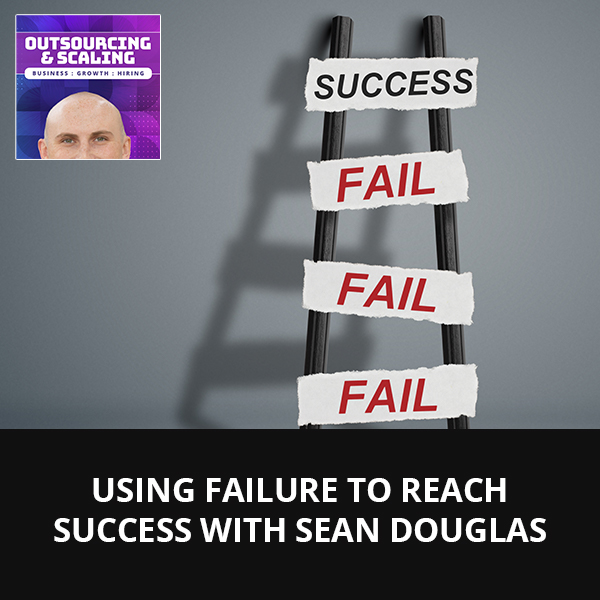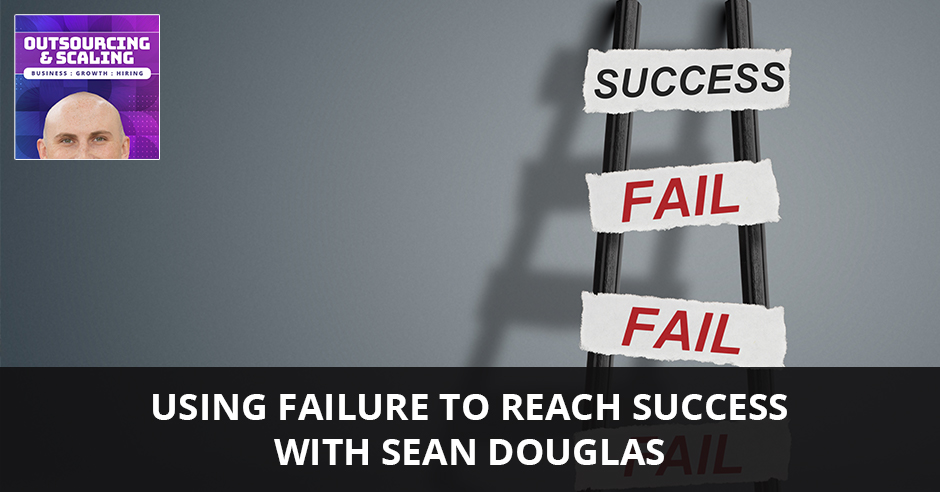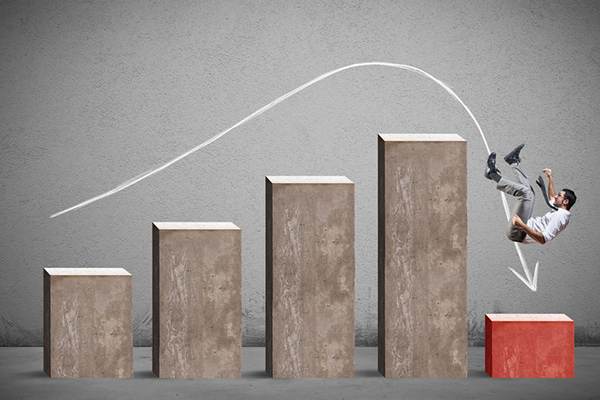


Success is not a good mentor or teacher, failure is because it makes you stronger and humble. In this podcast episode, Host Nathan Hirsch talks with Sean Douglas about his interesting experiences and stories on how he was able to grow his business and achieve success and his hiring experiences that you can learn. He dives deeply into discussing how he leverages entrepreneurs, speakers and business owners to re-frame failures as a learning opportunity and a new possibility to become better and achieve success. Sean Douglas provides helpful pieces of advice to entrepreneurs to be successful in business and in life. Join Sean Douglas as he imparts his knowledge in taking your business into the next level and leverage it to success.
—
Listen to the podcast here:
[smart_track_player url=”https://www.podetize.com/statsapi/www.podetize.com/wp-content/uploads/fileuploads/11-5b145ef137b51b3d1af0633e9305c43d/11/2019/21203b045eb11762dfbf72f630c37813.mp3″ title=”Using Failure To Reach Success With Sean Douglas” artist=”Nathan Hirsch” image=”https://freeup.net/wp-content/uploads/2019/04/OAS.png” ]
Download the audio file here.
Using Failure To Reach Success With Sean Douglas
My guest is Sean Douglas. Sean, how are you doing?
I’m doing amazing. How are you?
I’m doing great. Sean is a US Air Force veteran, TEDx speaker, Master Resilience Implementer, Suicide Awareness Trainer, Business Position Strategist, international radio show host of the Life Transformation Radio, and author. He is a suicide survivor who hit rock bottom. He believes that you are created for a purpose, and once you unlock your true potential you will elevate your life, which is why you found the success course. Sean works with entrepreneurs, speakers, and business owners to improve their positioning in the market, which increases profitability while decreasing their anxiety and stress they feel in life. Thank you so much for joining us. I’m excited to talk to you. Normally, I go back and ask people what they like growing up were? Were they a straight-A student? Were they a rebel? I’d love to hear your story. If you could take us back there, but I know you had some pretty powerful things that happened in your life. I’d love to hear a summary of the story.
I was born and raised in Detroit, lived there until the age of eighteen, and from the time that I was in second grade until the time that I was in the seventh grade, I was physically, emotionally and mentally abused as a child by my ex-stepdad. My mom and dad divorced when I was in first grade because my dad went into the military. My mom didn’t want to wait around so she divorced him, got in with another guy, and so I lived an alcohol-dominated and domestic violence type of household.
Be grateful that you have negativity in your life because it makes you stronger.
By the time I was eighteen, I had lived in eleven different houses and I attended eight different schools, always moved around, we either got evicted or we were living in my grandparent’s basement twice. We lived in my grandparent’s fully-furnished basement that was like a cellar, full-furnished basement everything. That was my childhood until seventh grade and then my mom divorced him, got in with another guy, we moved in with his house. He was all emotionally messed up and never had any kids, and that wasn’t a great environment. Finally, my mom moved and got her own house up in the north of where we were living and I finished out high school there and then I joined the Air Force right after 09/11.
What stands up about my story is that I never dealt with anything that happened, I took it as it came and never thought about it, internalized it, whatever. I never thought that it would impact any decisions, until I got into the military and I started getting to alcohol, started doing stupid stuff, started becoming an adult. I started getting into the tendencies that I saw as a kid because I didn’t have anything else modeled for me. I found out quickly that that is not the right way to act as a family man, as a husband, boyfriend, whatever. There was a lot of not having a lot of valuing yourself type of situation.
You had a lot of success since then and unfortunately enough where I grew up, I had a great supporting family. There are people that have that and they go down the wrong path, there are people that have a rough upbringing and they turn around and crush it or vice versa. Where do you see that balance between how do you good upbringing lead this success versus being your own person and figuring out for yourself?
Ever since I was in fourth grade, I always had a resilient, survivor type of mentality. This is great. I’m out shoveling snow, raking leaves, mowing yards, planting flowers, whatever I can do in the neighborhood to earn money so we can eat. I specifically remember coming home one winter night and I was like, “Mom, I got $60,” and he was out doing his bingeing and he would hock things around the house to go pawn for drugs and things. I said, “Mom, we got to hide this money.” I remember that so distinctly because I have four kids and my kids don’t have to worry about making money or hiding money or any of that stuff. That’s one thing that they do not have to do. If I have to gauge my home life against my childhood home life, it’s drastically different.
Tell me about your first entrepreneur endeavor. What was it? How did that go?

Besides the raking leaves, shoveling snow, things like that, you make lemonade stands. I used to take things from the curb, repurpose some and sell them. My mom used to do the same thing, take things from the curb like a dresser, sent it down, paint it, whatever we’re going to do, just repurpose some things. Once I got to high school, it was trading cards baseball, football, hockey, getting into trading cards, going to card shows. Once I got into an adult, my first real entrepreneurship was creating an entertainment company producing weddings, DJing at bars and clubs, doing quinceaneras, retirement ceremonies, Christmas parties, office parties, military graduations from Airman Leadership School or whatever it was for, producing conferences, summits, events, things like that.
Talk to me about growing your first business. I’m assuming you had to hire some people. What was your first hiring experience like?
It was an epic fail. I’m big on word of mouth and I’m big on referrals, huge on referrals. Somebody comes highly recommended and I’m like, “That’s awesome” Coming to find out the highly recommended person who is doing the highly recommended was my friends like brother, all is great and he is amazing I’m like, “Cool” I didn’t even put the two together until he bailed on a gig that we had, he no-showed, fifteen minutes in, 30 minutes in, an hour and I didn’t get a phone call, like “Yeah, he should be there.” He didn’t even show, so I had to rush over there, setup start like we had to give back a bunch of money, only got paid half, and all I hear is, “My brother is,” I’m like, “Your brother? Hell no, I never work with family, period, the end.” If I have four people that work for me, you’re not hiring anybody of your family. I will not have office politics at all ever, and usually the family is the worst people you could ever work with ever, because there is no filter. It turns out it was this person’s brother and I’m like, “No, it’s not happening” so fire, it nearly lasted a couple of weeks.
I don’t know if I’ve shared this with my audience, but on my birthday this year, I have an awesome VA team and they were two people I had to fire and found out that they were dating at that time and both of them used to be good, their performance went down, I’ve no idea what was going on or wasn’t going on their personal life, and how I knew that, then I wouldn’t hire them, but that doesn’t happen, you have to be aware of it. What kind of relationships to these people have outside of the office?
I even had a client, if you go to our YouTube video you can see a video by one of our clients, Norman, and he hired an entire family to run his business, he pissed off someone in that family one day and the entire team quit on him. There were seven people running his whole business. You can’t put all your eggs in one basket and I think that’s a great lesson that you shared with us. I know that you’ve done a lot with TEDx, I know you’ve done a lot with helping people get over the struggles that they’ve had. I think for people on the outside, people who haven’t suffered from depression or gone through something in life, it’s tough for us to relay. Can you do your best describe what’s going through someone’s head that will force them to take action like that on their own body and their own life.
Always look at failure as a learning opportunity to be successful.
My TEDx was pretty dark and deep in the first couple of minutes. Like I’ve said, I was running for a few years. I was running a six-figure. I never had an issue with money, I was always getting booked. I was always doing something somewhere; I never had an issue. I would book three or four events in the same day. I got a wedding at 2:00, that was done at 5:00, I got to go to this other party at 6:00, that will be done at 9:00, I’ll go do this club like 10:00, 11:00, 12:00, I would do double or triple, but that takes a toll on you even if you have three or four people working with you. It takes a toll on you and with me it was never enough. I had to do more. If I didn’t make enough money that day, I felt like a failure and I am the worst person to myself. If somebody else thinks that I’m not good enough, it’s exacerbated, it’s even worse, so I’m really hard on myself. It’s a good toll, I started fighting alcohol, started using that to bypass the pain, the hurt, the failure. I take failure well. I thought the failure was the worst thing ever, and I now I don’t.
Everything that I used to do is the complete opposite of how I operate now. In that mindset, at that moment, you’re on quicksand, you feel like there is no other way, you feel like there is no way out, when you’re drowning death, or you’re drowning in relationship woes, or you’re not as successful as you thought you’re going to be, so many different things happen in life. If you feel like there is no way out and you feel like the weight of the world is on top of you, you start to go down this deep dark path. You start having these uncharacteristic thoughts, like maybe nobody will miss me, like why do I even bother, I suck at everything I do. Nobody will ever remember me when I’m gone anyway, or my team would be better off without me, maybe I should quit and give it to them, maybe I’ll fall on a gutter or something. I would have these thoughts like I would drive my truck off the bridge, this is stupid. I can’t even do this. It was bad.
You’re having success. It’s not like you’re a failure out there looking for a job, but you’re running a pretty large business.
I got people all over the place that I would fly out to different places, different states, produces one event, speak at this one thing, do this one thing, I would have every single weekend will be booked with something, be a wedding, quinceaneras, a party of some kind, an office event, a summit, a conference, every weekend we’re doing something. What it was, I get five yeses like, “Yeah, let’s do this.” “No, we don’t need your service” and I’ll be like, “I’m a failure” it was that bad. I was so bad.
How do you help people get over that?

Now I look at failure as a learning opportunity. I had to free my mind to say always, “No, I’ll show you. I’ll make you sorry you didn’t hire me.” I use it as a fuel, because negativity used to draw me down. I’m not even joking. If somebody was like, “Your business sucks.” I’m like, “Does it?” I was a people pleaser, everybody had to like me, everybody had to be a part of my company. I had to serve everybody. I had to make everybody happy. I will go to the end of the world to make everybody happy. Now I understand that you can’t make everybody happy. I could deliver triple-A, four-diamond service, I’m talking restaurant like five-diamond, and still somebody would be unhappy.
I met people in my entrepreneur journey. If I gave them a million dollars in a brown briefcase, they would be pissed off because the briefcase was brown instead of silver. I’ve met these people. I’ve met so many people at the conference and events and different things that they are so happy, everybody is amazingly happy with the service that we provide, except for one person. That one person just ruined everybody. It’s that one person and so I let that stuff not bother me anymore. I use it as fuel. I always learn to get better. Whatever the feedback is I’m like, “Thank you. Appreciate that. I’m going to get better and I’m going to keep on going” Now I want to fail epically and I want to fail hard because there is so much learning in failure and so much growth in your mind, body and soul in that failure that you can’t help it get better because it’s all upside after the failure.
How do you help people get over it? I almost feel like it’s the wrong thing to say because I think for people on the outside is like, “You should overcome it, you should be more positive,” that most make it seem too easy, but for someone that is handling that. It’s not something you fix and it goes away, I’m assuming he is with you after the fact and you’re constantly battling against it.
Everything I said, I teach people that mindset. Literally is, “How you feel about that failure?” I was like, “How can we reframe this? What do you think you should reframe it as?” I walk him a process. “What do you think that failure means?” Because you have to become a master of meaning and you are the only person who ever gives meaning to any situation that you encounter, and I coach people on doing that. Everything I describe reframing the failure into a growth mindset, reframing that failure into a learning opportunity and a new possibility to become better. I teach people how to do that. Once you can accept that in your mind that failure is a good thing and that you want to fail, especially when you start a new business like fail fast and fail often. Keep that crap out of the way. Fix everything that is broken. The last thing you want to do is build a six or seven-figure business and all of a sudden one day, the bottom falls out and you failed a few years in.
What advice would you give to successful entrepreneurs to keep it going, to avoid starting to go down that bad path to begin with?
Don’t rest on the laurels of what got you there. Always be innovating, always be growing, always be failing.
If someone is reading out there and they have been struggling with anything, whether it’s in their personal life, whether it’s in business, do you have any overall advice other than what you talked about before?
There is so much. I want people to be grateful, like gratitude is my number one superpower. Everybody always talks about when you’re in the middle of it, how are you feeling, because we can look back. You and I can look back several years ago and be like, “It’s kind of sucking it back then” but being grateful for everything, being grateful for the family, the friends, the money that you have. The money that you don’t have, the money that you’re trying to earn, the clients that you have, everything at this moment, the bad, the good, the ugly, everything you have. Be grateful because you can learn so much if you take an inventory of the things that are going well and the things that are not going well because we tend to focus on either all the good or all the bad. I want people to take inventory and take stock of everything that is going on, the good, the bad, the ugly, everything, and be grateful because everything is happening for you. It’s not designed to destroy you as people think like all the negativities are going to tear me down. Grow from it. Be grateful that you have negativity in your life because it makes you stronger.
For those of you following me, it’s been rough because our Facebook page got removed because one of Facebook’s bot took it down and it’s so easy to be like, “It’s me. I put so much work into that,” whatever. You got to look as a whole like I’m so fortunate to be in this situation. I have flexibility whether it’s freedom financially, whatever it is and we’re in this position with the great business, and there is a setback. There is going to be hiccups, there’s going to be things that don’t go the way you want, failures like you said and you got to keep that positive mindset. You got to enjoy the moment. Things can be so different a year from now whether it’s your health, your family, your business, all that stuff can change quickly, you got to appreciate the moment, appreciate what you’ve built so far.
Think about it too. You have different social media profiles. If you’re only on Facebook and that crashes, you are toast. You got to rebuild all that all over again, but luckily you’re smart enough to have various different avenues of revenue and growth than everything that you are doing. Yeah, the page was down, yes on things and it sucks, but you have other avenues that you can rest on while rebuilding that one piece. That’s a great lesson to be learned too. Lost everything, how am I going to fix this, what can I do, or how can I? These are the questions that we ask as the full proof of everything because when the recession hits, we need full proof of ourselves.
Sean, this has been great. Where can people find out more about you? What are you most excited about?
People can find me at my website is TheSuccessCorps.com, I’m on Facebook, I’m on Instagram and on LinkedIn, so would love to connect with everybody on there. What I’m most excited about is halfway to the year, there is no halftime, we’re getting up to the end of the second quarter, roll on the right into the third quarter, no breaks. I loved everything that has happened, the failures, the success, everything that has happened in 2019 is my most profitable year, my best year ever, and I’m so blessed. I can’t wait to see what the rest of 2019 has for me and everybody that I’m associated with.
Sean, thanks.
Thank you.
Important Links:
- Life Transformation Radio
- TheSuccessCorps.com
- Facebook – The Success Corps
- Instagram – The Success Corps
- LinkedIn – Sean Douglas
About Sean Douglas
 Sean Douglas is a U.S. Air Force Veteran, TEDx Speaker, Master Resilience Implementer, Suicide Awareness Trainer, Business Positioning Strategist, International Radio Show Host of Life Transformation Radio, and Author. He’s a suicide survivor who hit rock bottom. He believes that you were created for a purpose, and once you unlock your true potential, you will elevate your life, which is why he founded The Success Corps. Sean works with Entrepreneurs, Speakers, and Business Owners to improve their Positioning in the Market which increases Profitability while decreasing their anxiety and stress they feel in life.
Sean Douglas is a U.S. Air Force Veteran, TEDx Speaker, Master Resilience Implementer, Suicide Awareness Trainer, Business Positioning Strategist, International Radio Show Host of Life Transformation Radio, and Author. He’s a suicide survivor who hit rock bottom. He believes that you were created for a purpose, and once you unlock your true potential, you will elevate your life, which is why he founded The Success Corps. Sean works with Entrepreneurs, Speakers, and Business Owners to improve their Positioning in the Market which increases Profitability while decreasing their anxiety and stress they feel in life.
